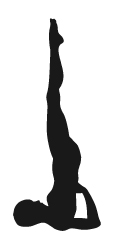12 Basic Asanas
Shoulderstand - Sarvangasana
- Headstand (Sirshasana)
- Shoulderstand (Sarvangasana)
- Plough (Halasana)
- Fish (Matsyasana)
- Sitting Forward bend (Paschimothanasana)
- Cobra (Bhujangasana)
- Locust (Shalabhasana)
- Bow (Dhanurasana)
- Spinal twist (Ardha Matsyendrasana)
- Crow (Kakasana) or Peacock (Mayurasana)
- Standing forward bend (Pada Hasthasana)
- Triangle (Trikonasana)

Definition: An inverted pose, with your body resting on your shoulders.
Sarvangasana, the Sanskrit name for the Shoulderstand, comes from the word "sarva", meaning whole. This Asana strengthens your entire body; it gives many of the benefits of the Headstand, but here the circulation is directed to your thyroid gland instead of the head.
Objective: To stretch your cervical and thoracic regions.
Step 1 - Legs in the air
Before beginning the Shoulderstand, make sure that there is enough room behind you. You must be able to stretch your arms out behind your head and have at least 30 cm (1 ft) between your fingertips and any obstructions. Lie flat on your back, with your feet together. Inhale while bringing your legs up to a right angle.
Step 2 - Moving Up
Tuck your hands under your buttocks, with your fingers pointing toward your spine. Then, as you exhale, gently raise your body by letting your hands walk down your back and push you into position.
Step 3 - In Balance
Continue to move your hands up your back until you rest on your shoulders. Breathe normally, and keep your legs straight. Hold for 30 seconds; as the pose becomes easier, increase the time to 3 minutes. To come down, drop your feet halfway to the floor behind your head. Put your hands on the floor. Unroll your body vertebra by vertebra to the floor. Hand position: Put your hands on the small of your back, with your fingers toward your spine.
Variation
Inhale with your hands on your back. Exhale and bring one foot to the floor behind your head. Inhale. Raise your leg. Swap sides.


